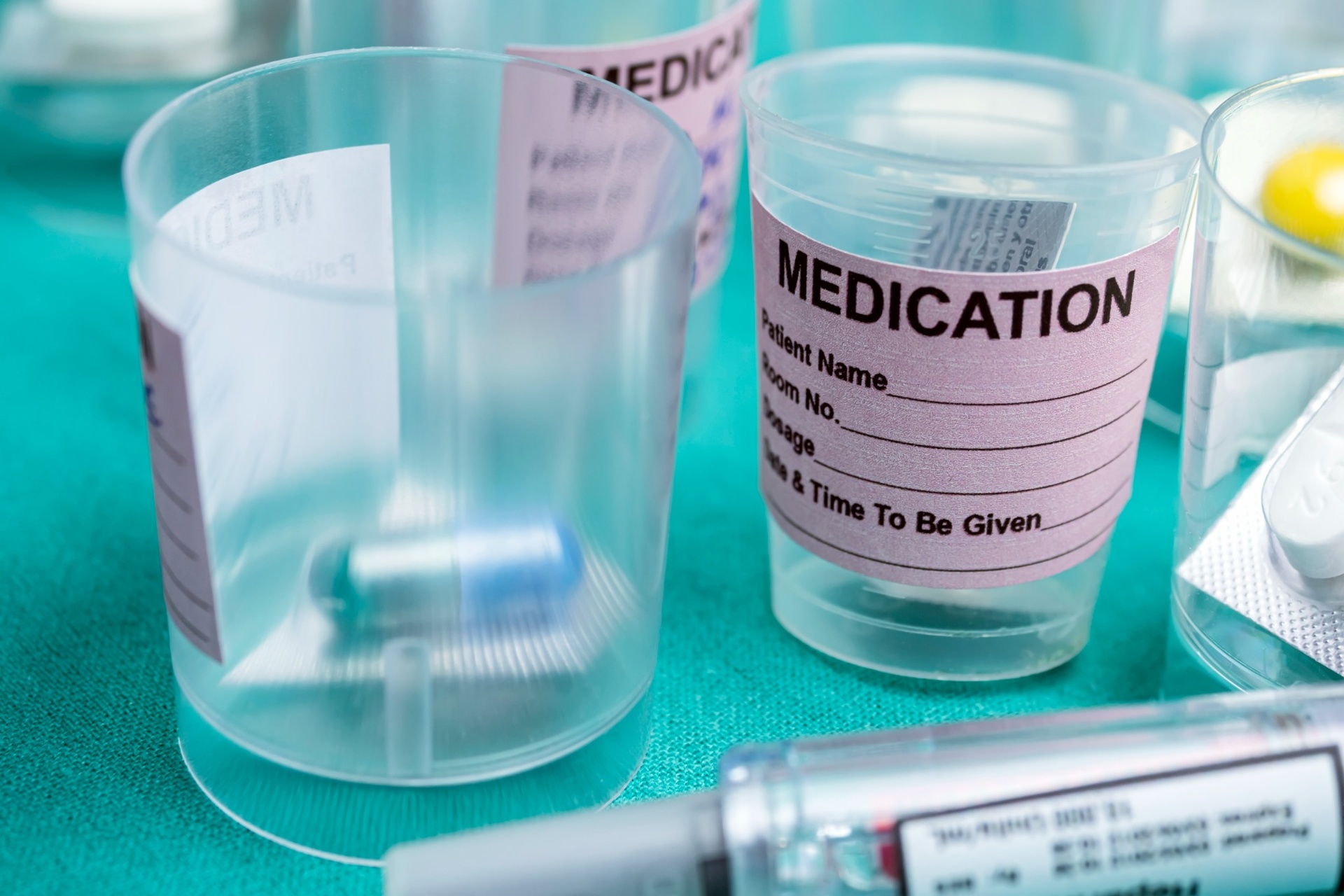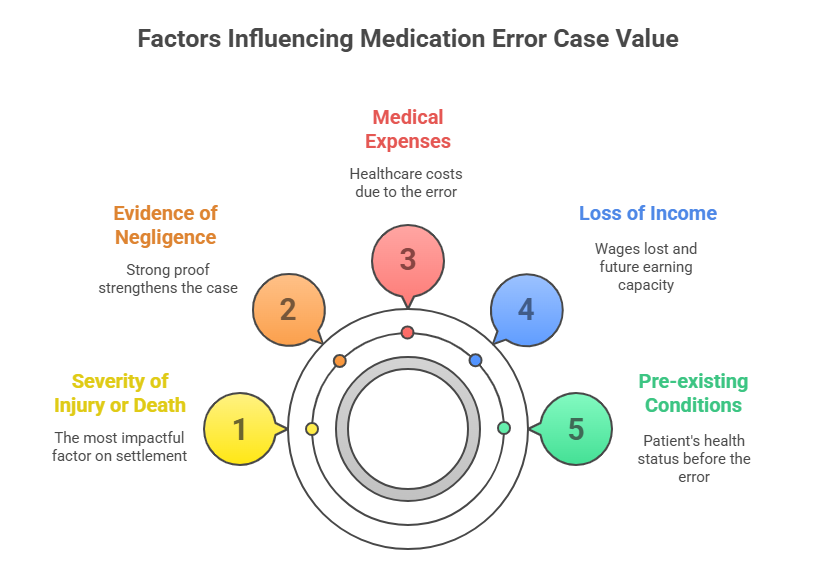
Average wrong medication lawsuit settlements in Maryland range from $100,000 to $905,000 or more. Settlement amounts are shaped by both outcome-related factors and evidentiary factors, including:
- Severity of injury or death
- Pre-existing conditions
- Evidence of negligence
- Medical expenses
- Loss of income
When a medication error occurs, the consequences can be devastating. As experienced medical malpractice lawyers in Baltimore, we understand the physical, emotional, and financial toll these mistakes take on patients and their families.
⚠️ Medication errors affect approximately 1.5 million people annually in the United States, with up to 9,000 deaths attributed to these preventable mistakes each year.
If you or a loved one has suffered due to receiving the wrong medication, wrong dosage, or improper instructions, you may be entitled to substantial compensation.
Our Baltimore medical malpractice lawyer has helped numerous clients secure the settlements they deserve after pharmacy and hospital medication errors.
What is a wrong medication lawsuit?
A wrong medication lawsuit falls under the category of medical malpractice claims. These legal actions arise when a patient is injured or killed because they received the wrong drug, incorrect dosage, or improper medication instructions due to a healthcare provider’s negligence.
These errors can happen at various points in the healthcare system – in hospitals, pharmacies, nursing homes, or clinics. The errors often stem from communication breakdowns, staff shortages, similar drug names, or failure to check patient information properly.
Filing a medication error lawsuit allows injured patients to recover financial compensation for their damages while holding negligent healthcare providers accountable for their mistakes.
Additional reading: wrongful death settlements

Can I sue for being given the wrong medication in Maryland?
Yes, you can sue for being given the wrong medication in Maryland if a medical provider’s error caused you harm and their mistake falls below the accepted standard of care. Maryland law recognizes that patients have the right to seek compensation when healthcare professionals fail to provide appropriate treatment.
However, Maryland has specific rules that can affect your case. The state follows a “contributory negligence” rule, which means if you’re found even 1% at fault for your injury, you may be barred from recovery. Maryland also has a cap on non-economic damages (pain and suffering), though there is no cap on economic damages like medical bills and lost wages.
⚖️ Maryland’s current non-economic damages cap for medical malpractice cases in 2025 is $905,000, with a higher cap of $1,131,250 for wrongful death cases with two or more beneficiaries. These caps increase by $15,000 annually.
To strengthen your case, gather all relevant medical records and preserve any medication bottles or packaging. Document your symptoms and medical treatments in detail.
For personalized guidance, speak with our Washington DC medical malpractice lawyer who understands how to handle complex medication error cases.
Common types of medication errors that lead to lawsuits
Medication errors can occur at various stages of patient care, from prescription to administration. Here are the most common types that lead to lawsuits:
- Dosage errors: Administering too much or too little of a medication, which can lead to overdose, toxicity, or ineffective treatment.
- Administration errors: Giving medication through the wrong route (intravenously instead of orally) or to the wrong patient.
- Prescribing errors: Doctors prescribing medications despite known allergies or medications that dangerously interact with other drugs the patient is taking.
- Drug interactions: Failing to recognize harmful combinations of medications that cause dangerous side effects when taken together.
- Dispensing errors: Pharmacy staff providing the wrong medication, incorrect strength, or improper instructions to patients.
⚠️ Many of these errors occur during shift changes, due to handwritten prescriptions that are difficult to read, or when hospitals and pharmacies are understaffed.
These preventable errors often involve high-risk medications such as blood thinners, insulin, chemotherapy drugs, and anesthetics, where even small mistakes can lead to serious harm or death.

Average medication error settlements in Baltimore
Understanding the potential value of your medication error case can help set reasonable expectations. Below is a table summarizing typical settlement ranges for different types of medication errors in Baltimore:
| Outcome | Typical Settlement Range | Example Scenarios |
|---|---|---|
| Wrong prescription | $100,000 – $500,000 | Doctor prescribing medication despite known allergies, wrong drug for diagnosis |
| Wrong dosage | $150,000 – $750,000 | Insulin overdose, chemotherapy overdose, inadequate pain management |
| Drug interaction errors | $200,000 – $600,000 | Contraindicated drug combinations leading to organ damage |
| Administration errors | $250,000 – $800,000 | Medication given through incorrect route, wrong patient receives medication |
| Dispensing errors | $100,000 – $450,000 | Pharmacy providing wrong drug or strength, incorrect instructions |
| Bad drug | $300,000 – $905,000+ | Defective medications, inadequate warnings about risks |
Settlements for wrong prescription
Settlements for wrong prescription errors in Baltimore typically range from $100,000 to $500,000. These cases involve situations where a healthcare provider prescribed the entirely wrong medication for a patient’s condition or failed to account for known allergies.
These errors are often traced to doctor negligence and can frequently be documented in medical records. When prescribers fail to check patient histories or use electronic prescribing systems incorrectly, patients can suffer severe adverse reactions.
💡 Hypothetical Example: A $425,000 settlement was reached after a patient was prescribed a medication they were severely allergic to, despite documented warnings in their chart. The patient suffered anaphylactic shock and required weeks of hospitalization.
Settlements for wrong dosage
Settlements for wrong dosage errors in Baltimore typically range from $150,000 to $750,000. These cases involve patients receiving too much or too little of the correct medication, often resulting in serious harm.
Dosing errors are particularly dangerous with medications like insulin, chemotherapy drugs, or anticoagulants, where precise dosing is critical. When too much medication is administered, patients can experience seizures, strokes, or organ damage; when too little is given, their underlying condition may worsen.
💡 Hypothetical Example: A patient received a $625,000 settlement after a Baltimore hospital administered five times the prescribed dose of insulin, leading to a hypoglycemic episode and permanent neurological symptoms.
Settlements for drug interaction errors
Settlements for drug interaction errors in Baltimore typically range from $200,000 to $600,000. These cases occur when two or more drugs are prescribed or dispensed together despite having dangerous interactions.
Both pharmacists and physicians have a duty to check for potential interactions using software or medical charts. Failure to identify these risks can lead to serious adverse events, including cardiac arrest, respiratory distress, or internal bleeding.
Some cases of drug interaction errors have resulted in fatal outcomes, particularly involving elderly patients who take multiple medications and whose bodies may be more vulnerable to adverse effects.
Settlements for administration errors
Settlements for administration errors in Baltimore typically range from $250,000 to $800,000. These involve situations where the right medication is given through the wrong route or to the wrong patient entirely.
These errors commonly occur in hospitals or nursing homes, often during shift changes or in understaffed units. Administration errors can cause immediate and severe reactions, including anaphylaxis, tissue damage, or cardiac events.

💡Hypothetical Example: A $690,000 settlement was reached after a hospital staff member administered a high-dose cardiac medication to the wrong patient due to a name mix-up between two patients with similar names. The error caused the patient to suffer a serious drop in blood pressure and cardiac complications requiring intensive care.
Settlements for dispensing errors
Settlements for dispensing errors in Baltimore typically range from $100,000 to $450,000. These cases involve pharmacy staff giving patients the wrong medication or incorrect instructions for use.
Dispensing errors frequently stem from misreading similar drug names, label printing issues, or miscommunication. These mistakes often go undetected until the patient experiences adverse effects after taking the wrong medication.
Always keep your pharmacy bottle and printed instructions—these can serve as vital evidence in pharmacy error cases.
Average settlement for a bad drug
Settlements for bad drug cases in Baltimore typically range from $300,000 to $905,000 or more. These cases involve defective or dangerous drugs that should never have been on the market or lacked proper warnings.
Unlike standard medication error cases, bad drug cases may involve both prescribers and pharmaceutical manufacturers, creating potential product liability claims. These cases often require extensive expert testimony about drug safety and FDA regulations.
📌 Bad drug cases can fall into two legal categories. If the harm was caused by a healthcare provider’s mistake, such as prescribing the wrong drug or dose, it’s typically a medical malpractice claim.
But if the injury was caused by a defective or dangerous medication itself, the case may involve product liability and be part of a mass tort against the drug manufacturer. These mass tort cases are relevant when many patients are harmed by the same drug, such as those with undisclosed side effects or black box warnings.
Not sure whether your case involves malpractice, product liability, or both? Our medical malpractice lawyers in Maryland can review your situation and help you understand your legal options. Contact us today for a free consultation.
What affects the value of a medication error case?
Several key factors determine the potential settlement value of your medication error case:
- Severity of injury or death – More serious injuries or fatal outcomes typically result in higher settlements
- Pre-existing conditions – The patient’s health status before the medication error can impact the verdict
- Evidence of negligence – Strong documentation of the error strengthens your case
- Medical expenses – Current and future healthcare costs directly related to the error
- Loss of income – Wages lost and reduced future earning capacity
Clear documentation of the medication error, such as pharmacy records, medication logs, or electronic health record entries showing the mistake, can significantly strengthen your case and increase settlement potential.
Your age, occupation, family circumstances, and the impact of the injury on your quality of life also play important roles in determining settlement value. Working with an experienced attorney is key to properly valuing all aspects of your damages.
⚖️ For more information on general settlement values in medical malpractice cases, read our “how much is the average medical malpractice settlement” guide.

How we investigate pharmacy and hospital medication errors
Our legal team employs a thorough investigative process to build strong medication error cases:
- Reviewing medication logs and pharmacy dispensing records to identify where the error occurred
- Consulting with medical experts who can testify about the standard of care and how it was breached
- Analyzing electronic health records for missed allergies, dosage changes, or overrides that contributed to the error
If you believe a drug error caused harm to you or a loved one, our attorneys can help uncover the truth and hold responsible parties accountable.
We also work with pharmacologists, nursing experts, and hospital administration specialists who understand medication safety protocols and can identify where breakdowns occurred. Our firm has access to the resources needed to thoroughly investigate complex medication error cases.
What to do if you suspect a medication error
If you believe you or a loved one has been harmed by a medication error, acting quickly can make a significant difference in both your health and your legal case. Here are the steps you should take:
- Request records immediately: Ask for medication administration charts, discharge summaries, and pharmacy logs. These documents can serve as early proof of what went wrong and who may be liable.
- Preserve medication packaging: Do not throw away medication bottles, labels, or inserts. They may contain evidence of dosage errors, patient misidentification, or manufacturer defects.
- Track symptoms and treatment: Keep a written log of all physical or emotional symptoms, including any changes in condition or emergency visits. Ask doctors to document these issues in your medical records.
- Contact our attorneys early: The sooner you reach out, the better we can help preserve evidence, guide next steps, and ensure you meet Maryland’s legal deadlines.
Acting quickly is essential, as Maryland Courts and Judicial Proceedings § 5-109 sets the statute of limitations for medical malpractice claims. In most cases, you must file within the earlier of five years from the date the injury occurred or three years from the date it was discovered.
Hypothetical scenario: Average settlement for medication error
⚖️ The following case illustrates how medication error lawsuits typically unfold in Maryland:
A 58-year-old woman from Baltimore underwent routine surgery at a local hospital. After the procedure, a pharmacy error resulted in her receiving another patient’s heart medication instead of her prescribed pain reliever.
The consequences were severe.
The error went unnoticed for 36 hours, leading to dangerously low blood pressure, kidney damage, and a stroke. She incurred $175,000 in medical bills and lost $30,000 in income during three months off work. Ongoing symptoms included fatigue, vision loss, and cognitive issues that impacted her career.
Clear documentation and expert support strengthened the case.
Hospital records showed that the wrong barcode had been scanned, confirming a direct medication mix-up. With this evidence, her legal team consulted pharmacology and neurology experts who connected the hospital’s mistake to her stroke.
Experienced legal representation made the difference.
The hospital’s insurer initially offered $200,000, citing averages from similar claims. But after she retained attorneys who focus on medical malpractice and medication error cases, they uncovered additional failures, such as understaffing in the hospital pharmacy and a lack of safety checks for high-alert medications.
Final settlement: $750,000.
The case was resolved without going to court. The settlement covered her medical bills, lost income, diminished earning potential, and pain and suffering. Without legal representation, she likely would have received less than one-third of that amount. The right legal strategy ensured her injuries were fully recognized and fairly compensated.
Reach out today for a free case evaluation
If you or someone you love has been harmed by a medication error, you don’t have to go through it alone. We know how overwhelming it can be to deal with unanswered questions, unexpected medical bills, and the feeling that no one is taking responsibility.
The most rewarding part of what we do is helping people whose lives have been turned upside down by medical mistakes. We take the time to listen, to understand your story, and to build a strong case that reflects the full impact this has had on your life.
Our team has represented clients across Maryland in medication error cases—helping them recover the compensation they need for medical care, lost income, and the pain they’ve endured. Let us do the same for you.
Call us today at 443-845-1456 or contact our firm to schedule your free consultation. We’re here to listen, to support you, and to fight for the justice you deserve

FAQs
Do I need a lawyer to file a claim for a medication error?
While not legally required, having an experienced medical malpractice attorney significantly increases your chances of success in a medication error claim. These cases involve complex medical and legal issues requiring specialized knowledge.
Our attorneys understand Maryland's medical malpractice laws, know how to gather proper evidence, can consult with qualified medical experts, and have experience negotiating with insurance companies to maximize your compensation.
How long do I have to file a medication error lawsuit in Maryland?
In Maryland, medical malpractice claims—including medication errors—must be filed within three years from the date you discovered (or reasonably should have discovered) the injury, or five years from when the error occurred, whichever comes first. Exceptions may apply for minors and individuals who lack mental capacity.
Because of these strict deadlines, it’s important to consult with our attorneys as soon as possible after discovering a potential medication error.
Can I sue a pharmacy like CVS or Walgreens for giving me the wrong drug?
Yes, you can sue pharmacies like CVS or Walgreens if they dispense the wrong medication or provide incorrect instructions that lead to harm. Pharmacies have a legal duty to accurately fill prescriptions and ensure patients understand how to take their medications.
Our attorneys have experience handling cases involving pharmacy errors, including dispensing mistakes that result in serious injury. These claims often involve proving that the pharmacy breached its duty of care and that the error directly caused the patient’s harm.
What compensation can I receive in a wrongful death case?
In a wrongful death case stemming from a medication error, eligible family members may recover compensation for medical bills prior to death, funeral costs, lost financial support, emotional pain and suffering, loss of companionship, and more.
Maryland places a cap on non-economic damages in these cases. As of 2025, the cap is $1,131,250 when two or more beneficiaries are involved. There is no cap on economic damages, like medical bills and lost future earnings.
